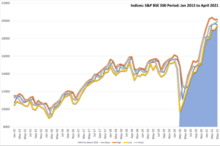Economic impact of the COVID-19 pandemic in India
However, after the announcement of the economic package in mid-May, India's GDP estimates were downgraded even more to negative figures, signaling a deep recession.
On 1 September 2020, the Ministry of Statistics released the GDP figures for Q1 (April to June) FY21, which showed a contraction of 24% as compared to the same period the year before.
[10] Major companies in India such as Larsen & Toubro, Bharat Forge, UltraTech Cement, Grasim Industries, Aditya Birla Group, BHEL and Tata Motors temporarily suspended or significantly reduced operations.
[14] However, on 25 March, one day after a complete 21-day lockdown was announced by the Prime Minister, SENSEX and NIFTY posted their biggest gains in 11 years.
[15] The Government of India announced a variety of measures to tackle the situation, from food security and extra funds for healthcare and for the states, to sector related incentives and tax deadline extensions.
The next day the Reserve Bank of India also announced a number of measures which would make available ₹374,000 crore (equivalent to ₹4.4 trillion or US$51 billion in 2023) to the country's financial system.
The Chief of Defence Staff has announced that India should minimize costly defense imports and give a chance to domestic production; also making sure not to "misrepresent operational requirements".
We can't pay salaries with this money" On 12 May the Prime Minister, in an address to the nation, said that the coronavirus crisis should be seen as an opportunity, laying emphasis on domestic products and "economic self-reliance", an Atmanirbhar Bharat (transl.
[166] Changes in FDI policy, privatization of the power sector, provident fund contribution and ease of doing business measures were also announced.
[168] Reports though stated the economic package did not address short term demand concerns, which may in turn pull down the economy even more; with most of the announcements being related to supply.
[165] It was also reported by economists such as Sonal Varma, Nomura Global Market Research, that "long pending politically sensitive reforms" have been pushed through during this time and with this package.
The package includes perks for central government employees to spend more on consumer durables during the festive season and a much higher capital expenditure for both the centre and states.
[20] On 18 April 2020, India changed its foreign direct investment (FDI) policy to curb "'opportunistic takeovers/acquisitions' of Indian companies due to the current pandemic", according to the Department for Promotion of Industry and Internal Trade.
[185][7] Confederation of Indian Industry (CII) had sought an economic fiscal stimulus package of 1% of India's GDP amounting to ₹2 lakh crore (equivalent to ₹2.4 trillion or US$27 billion in 2023).
[209][210] Krishnamurthy Subramanian, the current CEA, said the GDP growth slowdown to 3.1% in Q4 FY20 is mainly due to the coronavirus pandemic effect on the Indian economy.
[233] Major companies in India such as Larsen and Toubro, Bharat Forge, UltraTech Cement, Grasim Industries, the fashion and retail wing of Aditya Birla Group, Tata Motors and Thermax momentarily suspended or significantly reduced operations in a number of manufacturing facilities and factories across the country.
[236] However, on 25 March, one day after a complete 21-day lock-down was announced by the Prime Minister, SENSEX posted its biggest gains in 11 years, adding a value of ₹4.7 lakh crore (equivalent to ₹5.5 trillion or US$64 billion in 2023) for investors.
[243] Delhi Police began issuing delivery agents curfew passes to make it easier for them to keep the supply chain open.
[245] The Department of Military Affairs led by the Chief of Defence Staff postponed all capital acquisitions until the coronavirus pandemic recedes.
[249][250] In May, the Chief of Defence Staff General Bipin Rawat again emphasized the need for India to minimize costly defense imports and boost domestic production.
[251] Maharashtra put a hold on all new capital works till March next year;[98] spending under government development schemes has been reduced by 67% for the current fiscal.
[270] On 29 April, Indian billionaire NR Narayana Murthy said that if the lockdown continues, India may see more deaths due to hunger than from the pandemic.
The managing director of Britannia stated that "if even one link in the supply chain is broken, the country could run out of stocks of packaged food in the next 7–10 days.
"[272] Although inter-state travel has been banned, it doesn't apply to essentials, and in places like Maharashtra the state police are yet to streamline the process, disrupting supply chains.
[276] The Prime Minister on 19 March urged businesses and high income segments of society to take care of the economic needs of all those who provide them services.
[280][281] The Ministry of Finance issued an Office Memorandum on 23 March 2020:[281][282] [...] wherever such contractual, the casual and outsourced staff of Ministries/Departments and other organization of Government of India is required to stay at home in view of lockdown order regarding COVID-19 prevention [...] they shall be treated as "on duty" during such period of absence and necessary pay/wages would be paid accordingly.
[309] The Modi government, in view of the coronavirus pandemic, suspended Members of Parliament Local Area Development Scheme (MPLADS) for two years.
[327] On 2 July 2020, The Times of India reported that a number of economic indicators such as the manufacturers Purchasing Managers' Index, goods movement, GST collections, electricity usage and rail freight transport showed significant improvement as compared to previous months.
[330] The economic survey of India for 2021, tabled during the Budget Session of the Parliament on 31 January 2020, stated that "starting July (2020), a resilient V-shaped recovery is underway".
This conclusion was based on indicators such as E-Way Bills, GST revenue statistics, commercial paper, steel demand and recovery in GDP growth.





